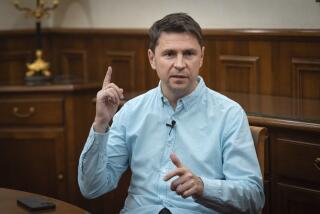Yeltsin Proposes ‘Civic Accord’ With Rivals : Russia: The pact would bar attempts to force early elections or trim the president’s powers. He unveils it amid new doubts about his health.
- Share via
MOSCOW — Seeking political peace for the two years left in his term, Russian President Boris N. Yeltsin has unveiled a proposed “civic accord” that would bar any attempt to trim his powers or force early elections.
But Yeltsin raised new doubts about his health by canceling a meeting Wednesday at which he was to hand the document to political party representatives. One aide said the 63-year-old president was hobbled again, apparently by a recurring spine ailment.
Since he crushed an armed rebellion last October and won enhanced powers in a constitutional referendum two months later, Yeltsin’s influence and authority appear only to have waned. Leaders of the revolt have left prison under an amnesty law that Yeltsin tried in vain to block, and they are rallying their partisans back to the streets.
Meanwhile, Yeltsin has all but dropped out of the struggle. In the past two months, he has retreated to his dacha near Moscow, then to a Black Sea hideaway, both times fighting what aides called the flu. They often feel compelled to deny rumors he is more seriously ill or depressed.
One thing Yeltsin has made clear is that he has no stomach for more of the bare-knuckled political feuds that plagued Russia in 1992 and 1993. His top priority now, says presidential spokesman Vyacheslav V. Kostikov, is achieving “a political breather, a kind of moratorium on political passions.”
Yeltsin’s draft civic accord, released late Tuesday by the Itar-Tass news agency, proposes just that. It calls on political parties, labor unions and social groups to renounce violence and accept the constitution as it is, without amendment, until after the 1996 presidential elections.
All signers would refrain from making divisive issues of the October, 1993, rebellion and the August, 1991, coup attempt that tried to restore hard-line Soviet rule. They would agree not to politic inside the armed forces or make “uncivilized” use of the mass media.
The government would respect other kinds of dissent, allow Russia’s constituent republics and regions more independence and set up a broad-based panel including business, labor and professional representatives to guide economic policy. Strikes aimed at securing a bigger share of the federal budget would be banned.
In a recent interview with the newspaper Izvestia, Yeltsin acknowledged that the accord, not legally binding, would be hard to enforce. “If we don’t achieve this result, I will suggest other ways, but I will not give up,” he said.
Reaction to the proposal was so mixed as to cast doubt on whether Yeltsin can rally a wide consensus by April 28, the first deadline for signing up. Ivan Rybkin, Speaker of the Duma, or lower house of Parliament, endorsed it in general terms, as did leaders of some moderate opposition parties. But criticism from others was fierce.
“The president feels that his position is weakening by the day even under the new constitution, and he is looking for some new document outside the constitution that would help him outsmart his opponents,” said Stanislav S. Govorukhin, a leader of the middle-of-the-road Democratic Party.
The Communist Party, bent on wresting powers from Yeltsin through constitutional amendment, accused him of trying to stack the rules in his favor. Other politicians, even some on Yeltsin’s side, dismissed the civic accord as a goal too utopian for a society so racked by economic upheaval.
“It’s like coming up to a patient dying of cancer and handing him a piece of paper saying that tomorrow he will be healthy,” said Duma Deputy Speaker Alexander D. Vengerovsky.
Other politicians believe that prospects for consensus brightened in January when the Yeltsin government, mindful of the success of Communists and ultranationalists in the December parliamentary elections, shed its most radical reformers.
But the post-election atmosphere, in which both sides were trying to appear conciliatory, may be dissolving. A new opposition coalition took shape last month as the Communists and their Agrarian Party allies joined forces with former Vice President Alexander V. Rutskoi, the main leader of the October rebellion.
Freed from prison, Rutskoi is preaching an unrepentant anti-Yeltsin line and hinting he will run for president in 1996--or sooner if he can force early elections. Rutskoi’s followers have taken to the streets peacefully but in growing numbers.
In an interview published Tuesday in Pravda, Rutskoi dumped on the civic accord, saying it is time “to stop playing with consensus or agreements and get down to work--to change the authorities by legal methods.”
Yeltsin had planned to counter by handing the accord to political leaders at the Kremlin on Wednesday. But he cut short his workday Tuesday, went to his dacha and stayed there Wednesday.
Sergei L. Loiko of The Times’ Moscow Bureau contributed to this report.
More to Read
Sign up for Essential California
The most important California stories and recommendations in your inbox every morning.
You may occasionally receive promotional content from the Los Angeles Times.













